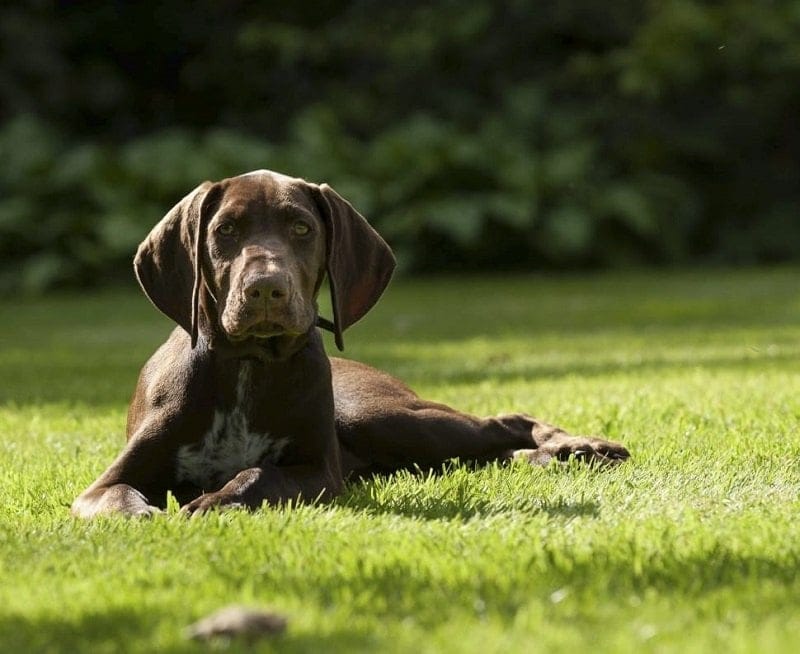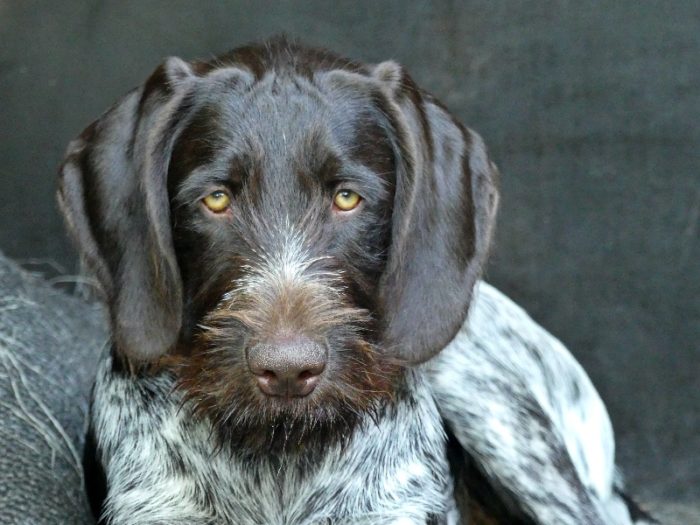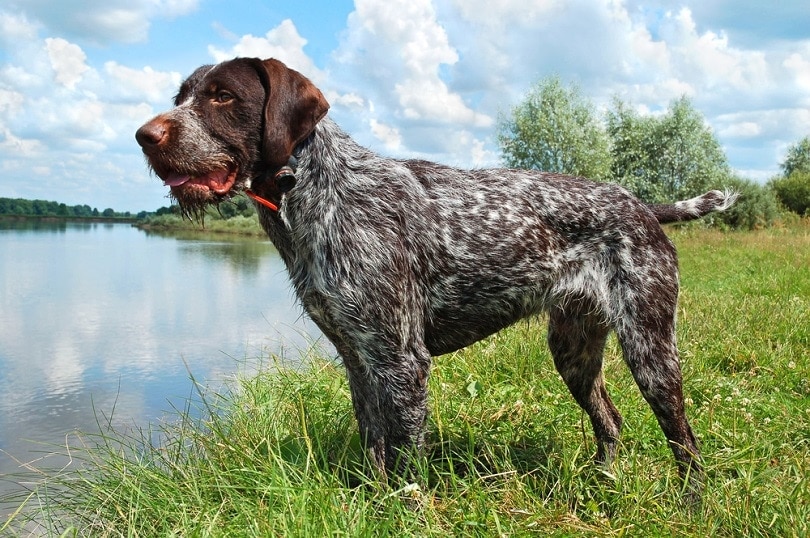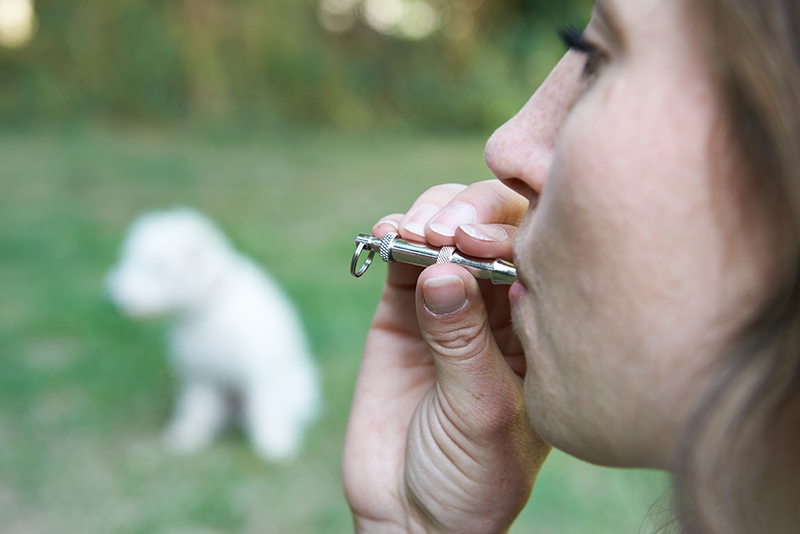How Big Do German Wirehaired Pointers Get? With Size & Growth Chart
Updated on

Click to Skip Ahead
If you’re looking for a loving, active dog to give a forever home, the German Wirehaired Pointer might be an excellent choice for you. They are active, comfortable on the land and on water, and make great hunting dogs and companions.
If you’re considering a German Wirehaired Pointer as a pet, you might wonder just how big the dog gets. In the guide below, we’ll give you an overview of this medium-sized adorable breed, how big you can expect the dog to get, and how to keep your pet healthy and happy, so join us.
German Wirehaired Pointers Breed Overview

The German Wirehaired Pointer is an energetic dog with a life expectancy between 14 and 16 years. If you’re looking for a dog to join you in your sports-related activities, this is the breed for you. You can expect your pet to reach 22 to 26 inches in height and be willing to play or hunt as long as you do.
The German Wirehaired Pointer is best suited for active families or individuals looking for a dog to be a companion indoors and outdoors. This talented working breed is extremely active, intelligent, affectionate, and loving with their family.
German Wirehaired Pointers have quite a fan base, and they are extremely popular as pets. However, you might want to know how big this adorable creature gets before deciding to welcome one into your home. We’ll give you a growth chart and more in the following sections to help you decide.
German Wirehaired Pointers Size and Growth Chart
The German Wirehaired Pointer Dog breed is a versatile, sturdy dog that thrives when allowed to play outside. The eager, affectionate, and funny pup makes a great companion for families and individuals. The breed is AKC-certified and generally weighs around 14.3 at 2 months of age.
| Age | Weight Range |
| 2 months | 14.3 pounds |
| 4 months | 34 pounds |
| 6 months | 46 pounds |
| 8 months | 53 pounds |
| 10 months | 58 pounds |
| 12 months | 63 pounds |
| 14 months | 66 pounds |
When Does a German Wirehaired Pointer Stop Growing?
Your German Wirehaired Pointer will be considered a full-grown adult when they’re 2 years old. At 14 months old, your pet will probably weigh around 66 pounds. Their bodies stop growing in 1 to 1½ years. Cognitively, however, most Pointers aren’t fully mature until after their second year.
Most medium and small-breed dogs mature quicker than the German Wirehaired Pointer, but for most Pointer owners, that’s an advantage they cherish. When your pet takes longer to develop, you can enjoy the puppy-like behavior for longer.

Factors Affecting the Size of German Wirehaired Pointers
Since the German Wirehaired Pointer is an active breed, it’s essential to ensure the dog gets the exercise they need. Dogs that don’t get enough exercise can easily become obese.
The diet you have your dog on can affect their size as well. It’s best for this breed to be on a high-protein diet, as they are active and will burn any calories they eat quickly. If you portion their food out and watch for any drop in weight, they should be fine. If you’re worried about your German Wirehaired Pointer’s size, it’s best to consult your vet. Your vet can help you develop a diet plan if your pup is too skinny or hefty.
Exercise can also play a huge role in the size of your German Wirehaired Pointer. If your dog doesn’t get enough exercise, they can become overweight. Ensure you exercise your pet every day for at least one hour. Hiking, running, and swimming are ideal activities to enjoy with your German Wirehaired Pointer.
Ideal Diet for Maintaining a Healthy Weight
It’s best to feed your German Wirehaired Pointer high-quality dog food with plenty of protein to fuel their active body. You also need to make sure that your pet has a diet filled with fiber, healthy fats, vitamins, and minerals.
Of course, the ideal diet for your pet varies according to your furry friend’s size, weight, and age. If you’re unsure how to maintain a healthy weight for your German Wirehaired Pointer, it’s best to contact your vet for a consultation. The vet will be able to weigh your little friend and tell you precisely what the best plan is to keep your dog healthy and happy.

How to Measure Your German Wirehaired Pointer
You can measure your German Wirehaired Pointer in a couple of ways. You can take a measuring tape and measure them from the tip of their nose to the base of the tail. When weighing your pet, you can stand on a bathroom scale and see how much you weigh.
Once you know your weight, pick up your dog and step on the scale again. Subtract the weight you get with the dog in your arms from the weight you got before, and that should be how much your dog weighs.
Of course, this isn’t a precise measurement, so if you’re still unsure of your dog’s weight, it’s best to make an appointment with your vet to determine exactly how much your dog weighs and if they’re in a healthy range.
Conclusion
As you can see, the German Wirehaired Pointer is a medium-sized dog that makes a remarkable pet for an active family. They weigh 50 to 70 pounds when fully grown. If you’re considering giving one of these adorable dogs a forever home, ensure you’re ready to provide at least an hour of daily exercise.
These dogs are very active, so you to need to be able to keep up so that the dog will remain healthy and happy for a long time to come. If you’re worried that your German Wirehaired Pointer isn’t growing the way they should, it’s best to visit your vet so that they can help you with the proper diet for your furry friend.
Featured Image Credit: Peakpx












